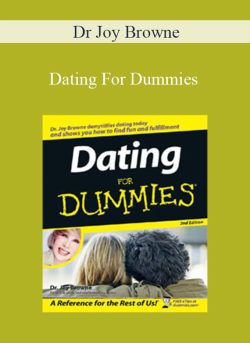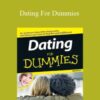$38.00 Original price was: $38.00.$12.00Current price is: $12.00.
Digital Download: You will receive a download link via your order email
Save up to 85% compared to Salepage prices. In addition, earn additional points. Save more on your next order.
Please contact email: esygbteam@gmail.com if you have any questions about this course.
 Purchase this course you will earn 12 Points worth of $1.20
Purchase this course you will earn 12 Points worth of $1.20Elevate your skills with the Dr Joy Browne – Dating For Dummies course, available for just $38.00 Original price was: $38.00.$12.00Current price is: $12.00. on Utralist.com! Browse our curated selection of over 60,000 downloadable digital courses across diverse Seduction and Love. Benefit from expert-led, self-paced instruction and save over 80%. Start learning smarter today!
 Dr Joy Browne – Dating For Dummies
Dr Joy Browne – Dating For Dummies
If you think dating is a simple process–meet someone, ask him or her for a date or get asked out yourself, try not to come off as a drooling moron, then arrange to get together for a second date or cut your losses and work to meet someone else–well, lucky you. For many people, it’s far more complicated than that, and Dr. Joy Browne addresses those complexities in Dating for Dummies. Exactly how do you meet a potential date? How do you present yourself in the most favorable light? How do you negotiate that first date? (One interesting story Browne tells is of a couple who negotiated a weekend together, deciding whether or not they’d have sex, and under what conditions they’d consider marriage and children–all before their first date.)And how do you proceed from there? The process still comes down to chemistry, but Browne shows how many ways there are to make sure you get your best possible chance with Mr./Ms. Right.
While you wouldn’t want to be caught dead reading either of these titles on the subway, they offer a study in contrasts. Baber and Spitznagel seem to have set out to produce a humorous look at dating and mating, but they deliver a boorish effort that will confirm a lot of women’s worst fears about male dating behavior. While some might think that the “humor book” caveat makes everything okay, the overall Beavis-and-Butthead approach to the subject?which is, less dating and more sex in these authors’ minds?provides little in the laughs department. Men and women should avoid this book like a blind date with a cold sore, and libraries can pass. By contrast and in keeping with the excellent “For Dummies” treatment of complicated subjects, psychologist Browne’s book offers a professional, insightful, and very readable examination of dating?real dating. Browne covers every aspect of the basic mechanics of dating in the 1990s, from making your own personal inventory to help you discover who you are and what you want, to finding appropriate people to date, to actually conducting dates at various stages of relationship development. Nothing seems to be missed by Browne: she tackles breaking up, sex, and even the darker sides of dating, like rape and stalking. This excellent book’s biggest drawback for libraries is its numerous “work form” sections, an invitation to certain patrons to make it their own. But Dating for Dummies is worth the risk recommended for all public libraries.
Delivery Method
Cultivate continuous growth with the Dr Joy Browne – Dating For Dummies course at Utralist.com! Unlock lifetime access to premium digital content, meticulously designed for both career advancement and personal enrichment.
- Lifetime Access: Enjoy limitless access to your purchased courses.
- Exceptional Value: Benefit from savings up to 80% on high-quality courses.
- Secure Transactions: Your payments are always safe and protected.
- Practical Application: Gain real-world skills applicable to your goals.
- Instant Accessibility: Begin your learning journey immediately after buying.
- Device Compatible: Access your courses seamlessly on any device.
Transform your potential with Utralist.com!
Related products
Seduction and Love
= 5 Points
Seduction and Love
= 9 Points
Seduction and Love
Gio Di Lorenzo – Dio Degli Orgasmi (Dio degli Orgasmi di Gio di Lorenzo)
= 8 Points
Seduction and Love
= 11 Points
Seduction and Love
= 13 Points
Seduction and Love
Speed Seduction Total Immersion 2011 Seminar Exclusive Bonuses
= 22 Points
Seduction and Love
= 8 Points
Seduction and Love
= 25 Points




 Dr Joy Browne – Dating For Dummies
Dr Joy Browne – Dating For Dummies







